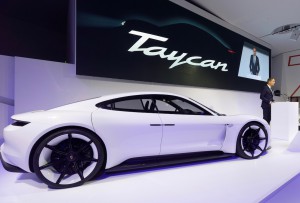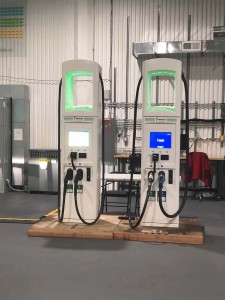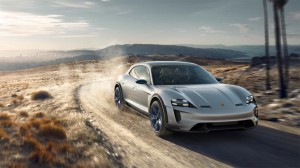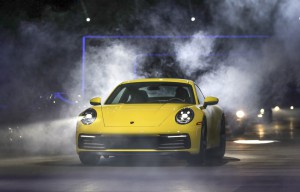
The new Porsche Taycan, formerly known as the Mission E, is just the beginning of a slew of new battery-electric cars coming from Porsche.
The Porsche Taycan will reach U.S. showrooms in the coming year, marking the first all-electric model from a brand that has built its reputation on high-performance versions of the internal combustion engine.
Initial demand is strong, a senior official told TheDetroitBureau.com during an interview at the Movin’On Summit in Montreal this week, with preliminary orders expected to account for the first two years of production.
The sports car arm of the Volkswagen Group has already announced plans for a second model, the Cross Turismo set to share the same underpinnings as the Taycan. While Porsche officials have hinted that there will be more battery-electric vehicles to come, they’ve not yet confirmed what’s next. But the real question is what won’t be electrified eventually. And the answer appears to be “nothing.”
“We are looking at the entire fleet” of products, said global purchasing chief Oliver Humpert, including the four-door Panamera and the Cayenne and Macan crossovers. Even the classic 911 Carrera won’t escape this transition, though Humpert cautioned that it “will be the last to go full-electric.”
(Porsche owners impact carbon footprint through program. Click Here for the story.)
Don’t expect to see Porsche’s vaunted internal combustion engines vanish, at least not for the foreseeable future. Instead, the automaker will give buyers electric options, including plug-ins and all-electric models.
That’s not a unique strategy. Alfa Romeo and Maserati are both developing a mix of powertrain options, Alfa brand boss Tim Kuniskis told TheDetroitBureau.com last summer.
Porsche has already shown the potential for battery-drive technology with the 918 Spyder flagship produced from 2013 to 2016. It used a kinetic energy recovery systems, or KERS hybrid, derived from Formula One to make it the most powerful Porsche ever produced at the time.
“You should get into the car and it feels like a Porsche,” Humpert stressed during an interview.
The good news for the brand – and the growing list of competitors who also electrifying – is that electric motors can produce gobs of power, with torque coming on all but instantaneously. If anything, Tesla’s biggest challenge for the second-generation Roadster it’s developing may be getting tires sticky enough to transfer all that initial power to the pavement.
The Taycan will derive power from two electric motors, one on each axle, generating a combined 600 horsepower. That will help it launch from 0 to 60 in an estimated 3.5 seconds. Top speed is rated at 155 mph. Meanwhile, with its battery pack mounted below the floorboards, lowering the Taycon’s center of gravity and improving handling.
Range is estimated at more than 300 miles. But the new drivetrain should have another big draw: it will be the first system capable of using the latest-generation, 800-volt, 350 kilowatt Level 3 chargers. That will allow a motorist to add as much as 20 miles more range per minute, a fully drained battery expected to reach at least 80% in under 18 minutes and possibly as little as 10.
While most owners will be expected to charge at home, industry experts believe a public charging network must fall in place quickly to assuage range anxiety for travelers covering longer distances. That’s beginning to happen as companies like EVgo and ChargePoint expand. Porsche will have a special relationship, meanwhile, with Electrify America. That’s the start-up funded by $2 billion of the settlement between U.S. and California regulators and Volkswagen in the automaker’s diesel emissions scandal.
Like sister brand Audi – which will share the same new EV driveline in its upcoming e-tron GT – Porsche is expected to offer Taycan buyers in the U.S. an account with thousands of free miles worth of electricity.
(Click Here for more about the new Porsche Macan.)

New, 350 kW chargers from Electrify America will allow Taycan to recharge nearly as quickly as a gas car could fill up its tank.
Taycan and the Cross Turismo will share their underlying architecture, as well as their drive technology. These were specifically developed for use in all-electric vehicles. But Porsche is expected to eventually modify platforms for conventional models, such as the 911, to be able to go all-electric. It’s already updated some platforms, like what’s used for the Panamera and Cayenne, to allow for plug-in hybrid drivelines.
The 911 will likely be the last of the main Porsche products to get an electric option, according to Humpert. He didn’t say why but as the icon of the brand it will be critical to make no concessions when it comes to performance and handling. Its small footprint could also pose a challenge to engineers trying to pack in enough batteries to deliver acceptable range.
Another reason why the 911 could wait a while to go electric is that Porsche only just recently launched the latest version of the sports car, so it will be some time before its ready for a re-do.
While luxury and performance automakers have become increasingly pleased with the performance offered by electric drive – as well as such benefits as near silence from their motors – there are other reasons the higher end of the industry is pushing quickly into this new space.
“Social acceptance of our cars is a core value of the brand,” Humpert said during an interview in Montreal this week. “We don’t want people to feel sorry if they drive a Porsche.”
Nor does Porsche want to see its products effectively locked out of some markets as tough new emissions and fuel economy mandates are rolled out. Sales of plug-based vehicles are soaring in China since the passage of that country’s New Energy Vehicle mandate. About two-thirds of the Norwegian market is all-electric because of its carrot-and-stick approach. That Scandinavian nation is planning to phase out sales of the internal combustion engine entirely over the coming decade, and a number of countries, including China, the UK, France and even Germany, are considering similar moves.
Cities like London and Paris, perhaps even New York, are also looking at banning vehicles running on gas or diesel, allowing access only to those in zero-emissions mode, whether all-electric or plug-in.
(Porsche planning to set new U.S. sales record in 2019. Click Here for the story.)
The threat of losing out in key markets, as well as the potential performance benefits of electric drive, will likely keep Porsche – and its competitors – plugged in.


